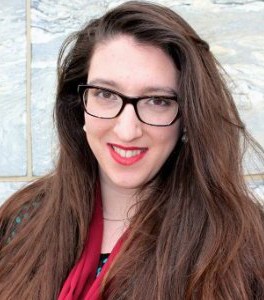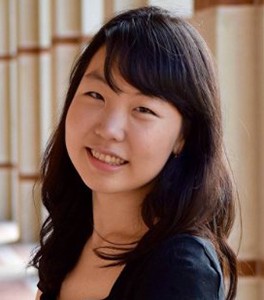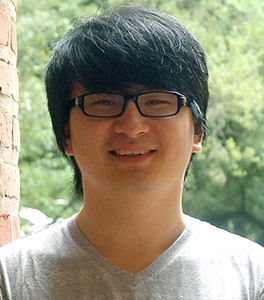
Julia Hossu, CS ’15, Software Engineer for DoubleDutch: five years old, 170 employees with 35 engineers
In this new series of panel interviews, we chat with a trio of CS alumni in similar environments in order to get an idea of their assignments, teams, and work-life balance. The series kicks off with a focus on working for startup companies. Meet Julia Hossu, Xilin Liu, and GaYoung Park –all working in the Bay Area.
Q: Why did you take your first job in a startup?
J: For me, it was an easy decision. I have a lot of interest in the product side, the user experience, and end user design. In a larger company, it seemed a lot harder to break into that side of the business because they had specific roles laid out for entering engineers and their existing teams were already handling that. In a startup, everyone wears different hats and not having experience in that role in the past was not a handicap.
X: Even though Door Dash offered me an internship, I chose one of the global giants instead. I purposefully turned down DoorDash because I wanted to test out working in a large company. My expectations were met, and I came back to DoorDash after graduation because I think startups are much more relatable. Here, I can grow as a developer. Also, in a startup, the headcount is so small that whatever you do is really important. At a bigger company, what you do feels lost somehow.
G: I only had one opportunity to do an internship since I started pursuing computer science during my sophomore year and had committed to a study abroad program for my sophomore year summer. My internship was at Tubular Labs, a 3-year-old startup with about 40 employees where I had the opportunity to talk to almost everyone in the entire company. My manager was the VP for Engineering and our CEO’s desk was just a couple steps away from my desk. I quickly learned that at a startup, it is easy to try a project or unofficially participate in another team for a week or a month. There isn’t a formal change process if employees want to try different things, which was perfect since I wanted to be able to try a lot of different things. I also really wanted to continue working with the people I met during my internship so it was an easy decision for me to want to return.

GaYoung Park, CS ’16, Software Engineer for Tubular Labs: four years old, 76 employees with 27 engineers
J: I’d like to echo that feeling, that it was an easier choice to make because at a small company you know exactly whom you are going to work with. If you really enjoy the five people you get to meet, you are pretty much going to work with those people. At larger companies, the new hires go through an orientation process and then get matched with a team; it might not be the same team you interviewed with, no matter how much you clicked.
Q: What has surprised you most about working in a startup?
G: All the code that I wrote so far got merged into the production codebase. I was treated like a full-time engineer from day 1 of my internship and the work I did mattered. When I got back to Rice after my internship, I heard friends who had done internships at bigger companies say their three-month project might not even launch. I had not even thought about what it would be like to be assigned a project that may not be used since all the code that I wrote that summer was used. It might have been revised after reviews, but it was never thrown out. To hear from peers that their code might not be important enough was a little distressing. I like knowing that what I do matters.
X: I was amazed at how quickly people started depending on me. In one of my internships, I don’t think they expected me to really contribute anything useful. But here, people started asking me questions about things I created right away. Because you are in a small team, every person has to pull their weight. You are onboarded quickly. There is no “sending things up the chain” here. Of course there are code quality checks, but it is more about getting things done than getting things done well. I know that sounds awful, but when resources are stretched so thin, it is more important to get things out. We don’t have a steady influx of money coming in, so we need to push features out to get more revenue. At large companies, there are multiple revenue streams that are still making money while you work on your project.
J: The first surprise was what I worked on. I joined as a mobile app person and had a lot of experience from previous internships when I started, but I was placed on our Analytics team which focused on a web platform and data pipeline. I had no experience working in web development and they gave me the option to switch, but I decided to try it out. Another surprise was the speed at which I was allowed to take responsibility of and have access to systems, processes and information that directly touched the customers at a press of a button. Also, at a small company, I have access to everyone, every resource. If I ask for one team’s support, or changes from another team, it is “yes, go for it, do whatever you need to do.”
G: Another thing that really surprised me was how quickly I became friends with my co-workers. A lot of them kept in touch with me when I went back to Rice, and when one of them found out that I was struggling as the semester picked up, she sent me a care package. If I go home because I’m not feeling well, I get five text messages from my co-workers asking if I need anything and that they hope I feel better soon. Most of the engineers I worked with during my internship were still there when I went back as an employee after my senior year at Rice. They’re not just my co-workers. They’re my support system.
Q: Describe your work-life balance in a startup.
X: The thing about a startup is you can work as much as you want. You won’t get fired for working an 8-hour day. There is some pressure to get things done and people may be working until 7, 8, 9, 10 pm but then come in at noon. If you leave at 8pm and then sleep and come in at 11am, there isn’t much time to yourself and weekends are really valuable.
Also, work should be fun. Your work friends end up being your social friends and you socialize late nights or having fun while you’re working. Yes, weekends are valuable, but we do still hang out sometimes. We don’t purposely “not” talk shop during weekend socials, but some people are still working over the weekends. I get email over the weekend, but I’m new to the area so I’m more focused on exploring and find new places in my free time.
J: I do choose to not think about work or technical things when I am not at work. I felt like it was definitely okay to do that. When I first arrived, I came in at 10 and left at 5:30 with no guilt. No one said –or even seemed to think– that I was not working hard enough or should have put in more hours. I knew a lot of people in the Bay Area, so I didn’t feel a strong need to hang out with my co-workers at night or on weekends. In the last year though, I have started seeing them more, especially people who have left the company.
Although my work-life balance goals are the same, my situation has changed. Earlier, as long as I met my project deadlines, I didn’t have to think about anything else. But half a year later, I became a team lead and my work-life balance changed. The team structure was constantly changing, and I was essentially the person on call for my product all the time. I sacrificed work-life balance in exchange for keeping the project moving forward.
G: I was pleasantly surprised to learn that I didn’t have to work long hours. Of course I can push myself if I want to but it’s completely up to me to make that decision. I definitely did not want to burn out so this was a good sign. There are a couple of people who come in really early and leave early but the majority of the engineering team shows up at between 10 and 11am and goes home between 6 and 8pm. There is no pressure to work at home.
J: When I got to the point of feeling overwhelmed, my boss hired other people. It really fluctuated. If you want to, you can end up putting in a lot of hours, so you have to choose your priorities. Now, I’m trying to get back my free time. I’m learning to not be so concerned about what happened today, there is someone else to pick it up. I no longer feel I have to check my email all the time and respond ASAP to everything, but that feeling of being the owner of a large part of something can definitely overwhelm you. The best thing was that they listened to me. There resources are there, but different from a big company so the change might not be immediate when you ask. Still, we would reprioritize projects and deadlines and shuffle resources to provide relief. Sometimes the overall balance business-wise is what is most important. Sometimes, it might be as simple as walking over to our CTO and saying “Hi, I need someone to help me with this or look over this.” There is a little more of pull than push, just go pull someone in. Just ask outright for help.
G: To add, about a month after I started work full-time, I did feel overwhelmed because I quickly got involved in the recruiting efforts and wanted to improve the onboarding process but was treated as an engineer who could dedicate most of my hours to engineering tasks. I felt that I had to work extra hours to keep up so I talked to my manager. “I’m having trouble,” I’d say, then ask, “Do you think I should pull away from these non-engineering projects?” We agreed that it’d be good for me to cut back on the engineering tasks instead. He allowed me to drive those changes and left it open to me to determine how much engineering work I could handle and adjust this as I saw fit every other week.
Julia Hossu completed a B.S. in CS in 2015.
Xilin “X” Liu completed a B.S. in CS in 2016.
GaYoung Park completed a B.A. in CS in 2016.
